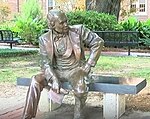Florida State University College of Law
Florida State University College of Law is the law school of Florida State University located in Tallahassee, Florida. The law school borders the southeast quadrant of the University's campus, near the Donald L. Tucker Center, an arena and part of the Tallahassee civic center area. The College of Law campus consists of four major buildings, four historic houses around a green and five parking lots. It occupies two full city blocks and is directly across the street from the Florida Supreme Court and one block from the Florida Legislature. The school's most recent addition is its 50,000-square-foot Advocacy Center, which includes five courtrooms. According to Florida State University's 2016 ABA-required disclosures, 72.6% of the Class of 2015 obtained full-time, long-term, bar passage required employment ten months after graduation. According to those same disclosures, 81.7% of the Class of 2015 obtained full-time, long-term, bar passage required jobs or JD preferred positions within ten months of graduation.
Excerpt from the Wikipedia article Florida State University College of Law (License: CC BY-SA 3.0, Authors).Florida State University College of Law
West Pensacola Street, Tallahassee
Geographical coordinates (GPS) Address Nearby Places Show on map
Geographical coordinates (GPS)
| Latitude | Longitude |
|---|---|
| N 30.439138888889 ° | E -84.286888888889 ° |
Address
Law Library
West Pensacola Street
32304 Tallahassee
Florida, United States
Open on Google Maps








